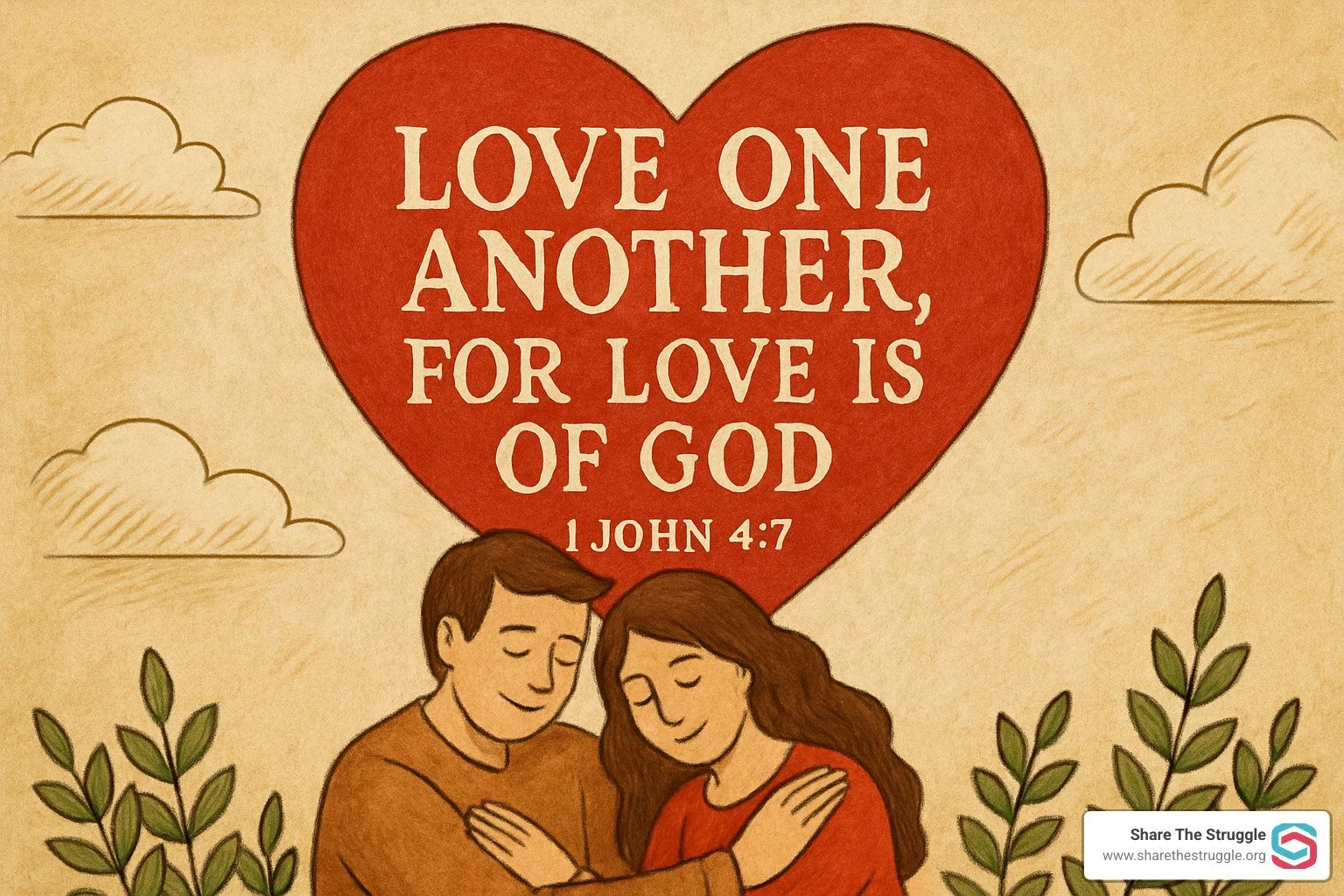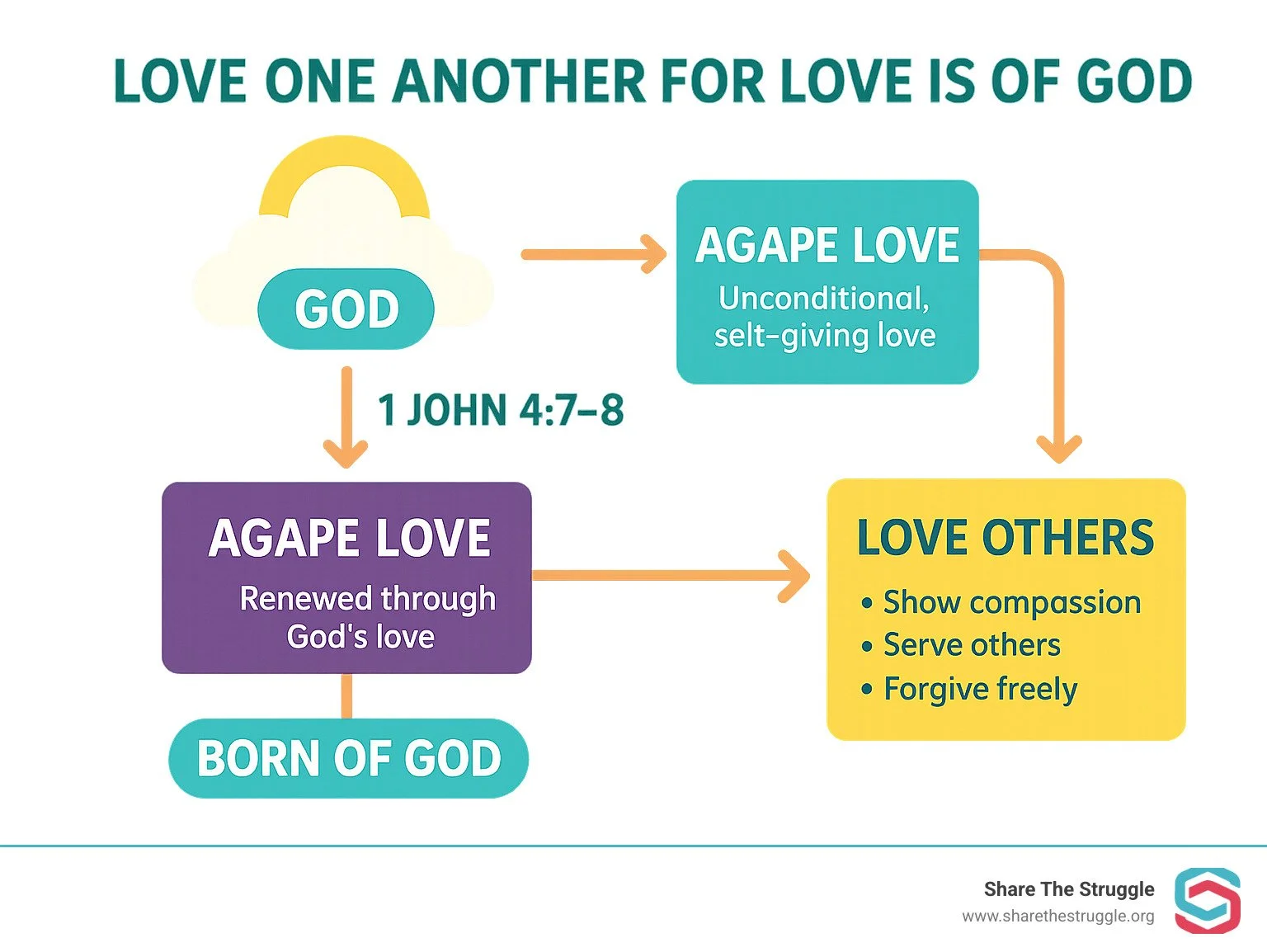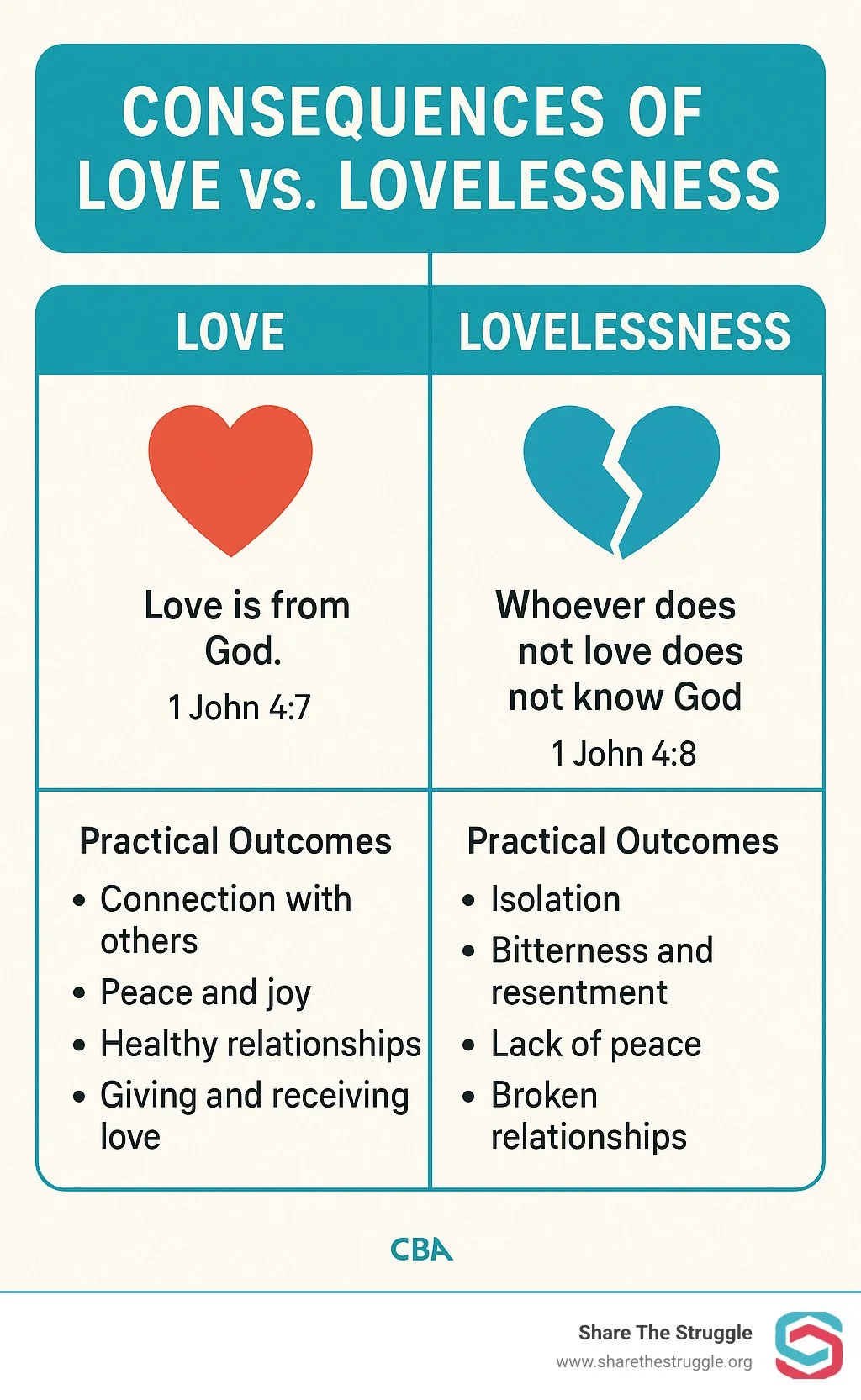Understanding 'Love One Another for Love is of God'
Why This Bible Verse Matters for Your Faith Journey
The love one another for love is of god verse found in 1 John 4:7 is one of the most powerful passages in Scripture about divine love and Christian community. This verse reads: "Beloved, let us love one another, for love is of God; and everyone who loves has been born of God and knows God."
Key Elements of 1 John 4:7:
Love's Source: All genuine love originates from God's nature
Evidence of Faith: Loving others proves we know God personally
Born of God: Those who practice agape love show they belong to God's family
Community Command: We're called to actively love fellow believers
This passage appears in the New Testament at least 13 times in various forms, showing how central this command is to Christian living. The Greek word agape used here describes unconditional, self-sacrificial love - very different from human emotions or feelings.
For many Christians struggling with anxiety, past trauma, or relationship challenges, understanding God's love can bring deep healing. When we grasp that love flows from God rather than our own efforts, it takes pressure off our performance and helps us extend grace to others.
Learning to love as God loves isn't always easy, especially when we're dealing with emotional wounds or mental health struggles. That's where faith-based coaching can provide valuable support in applying these biblical truths to real-life situations.
"Love One Another for Love Is of God" – The Biblical Foundation
When the apostle John sat down to write his first letter, he had lived through decades of following Jesus. He'd seen the crucifixion, witnessed the resurrection, and spent years building the early church. Yet when it came time to share what mattered most, he kept coming back to one simple truth: love.
This wasn't just any kind of love, though. John used the Greek word agape throughout his writings—a word that describes something far deeper than human affection or romantic feelings. Agape is the kind of love that chooses to act for someone's good, even when it costs us something. It's the love that sent Jesus to the cross.
The beauty of John's teaching is how it connects to everything Jesus said about love. Remember when Jesus called love the Greatest Commandment? He told us to love God with everything we have, and then love our neighbors as ourselves. John takes this a step further, showing us that when we love others, we're actually proving something important about our relationship with God.
This isn't just nice theology—it's practical truth that changes how we live every day. When we're struggling with difficult relationships or wrestling with our own emotional wounds, understanding that love has a divine origin can transform everything. You can explore the Berean Standard Bible Audio to hear these powerful verses in their original context.
What the Phrase Means in Context (1 John 4:7–8)
Let's dig into what John really means when he writes this love one another for love is of god verse. He's not just giving us a feel-good message about being nice to people. He's making a bold claim about how we can tell if someone truly knows God.
John says that everyone who loves "has been born of God and knows God." Think about what that means. When you're born into a family, you naturally pick up traits from your parents. You might have your mom's eyes or your dad's sense of humor. In the same way, when we're spiritually born into God's family, His love becomes part of who we are.
The phrase "born of God" describes a real spiritual change that happens when we become Christians. It's not about trying harder to be loving—it's about receiving a new nature that naturally expresses love. This takes so much pressure off! We're not striving to earn God's approval through perfect love. Instead, we're learning to let His love flow through us.
When John talks about "knowing God," he's describing intimate, personal relationship—not just head knowledge. It's the difference between knowing facts about your spouse and actually being married to them. Real knowledge of God always shows up in how we treat other people.
God Is Love (1 John 4:8)
Here's one of the most quoted verses in the entire Bible, and for good reason. When John writes "God is love," he's revealing something incredible about who God is at His very core. This isn't saying that God just happens to be loving sometimes, or that love is one item on a list of God's qualities. Love actually defines His essential nature.
Within the Trinity, we see this love in perfect action. The Father loves the Son, the Son loves the Father, and the Holy Spirit flows from their mutual love. This eternal relationship of self-giving love existed before anything was created. It's the original pattern for all genuine love.
This truth can be life-changing, especially if you've grown up thinking you need to earn God's love through good behavior. You don't have to perform perfectly to be loved by God—love is simply who He is. When we really grasp this, it frees us to love others without keeping score or expecting something in return.
For those of us dealing with anxiety, depression, or relationship struggles, this foundation makes all the difference. God's love isn't based on our emotional state or how well we're doing. It's constant, reliable, and always available to flow through us to others—even on our worst days.
Human Love vs. God's Love: A Clear Contrast
Let's be honest—most of us have experienced the disappointment of human love. Maybe a friend turned their back when things got tough, or someone promised to love you "no matter what" until circumstances changed. That's because human love, while beautiful in its own way, comes with built-in limitations.
Think of it like the difference between a flashlight and the sun. A flashlight works great until the batteries die or you drop it. But the sun? It just keeps shining, day after day, regardless of what's happening on earth.
Human love typically operates on conditions. We love people who are kind to us, who meet our needs, or who make us feel good about ourselves. When our emotions are running low or someone disappoints us, that love can flicker or even fade completely.
Research shows that 58% of practicing Christians say "showing love to others" is the most important way to live out their faith. Yet many of us struggle with actually doing it. Why? Often it's because we're trying to love others through our own limited human strength instead of tapping into God's unlimited supply.
God's agape love works completely differently. It flows from His unchanging character, not from how others behave or how we're feeling on any given day. This love is sacrificial and self-giving—it seeks the other person's highest good even when it costs us something.
The love one another for love is of god verse becomes so much more meaningful when we understand this contrast. John isn't asking us to manufacture perfect love through willpower. He's pointing us to the divine source that makes genuine love possible. For deeper insight into knowing God personally, this resource explores the intimate relationship that transforms how we love.
This is where the Spirit-empowered life comes in. Through the process of sanctification, God gradually transforms our hearts to love more like He does. It's not instant, and it's not always easy, but it's real change that others can see.
When we're struggling with anxiety, past trauma, or difficult relationships, learning to receive and give God's love can bring deep healing. But sometimes we need support in understanding how to practically live this out—especially when our emotions or mental health challenges make loving others feel impossible.
Loving Others as Evidence of New Birth
Here's where John gets pretty direct with us. He presents love as what we might call a spiritual fruit test. Just like you can tell an apple tree by its apples, you can recognize someone who truly knows God by how they treat other people.
This isn't about being perfect or never having a bad day. We all have moments when we're grumpy, hurt, or struggling. What John is talking about is the general direction and desire of our hearts over time.
Someone who consistently shows indifference or hatred toward others—especially fellow believers—might need to honestly examine whether they truly know God. That's a sobering thought, but it's also meant to be helpful. It's like a spiritual health check that can show us where we need God's help.
John calls this the light-test because genuine spiritual change produces visible results in our relationships. When God's Spirit lives in us, we find ourselves actually caring about other people's welfare. We start forgiving offenses instead of holding grudges. We look for ways to reconcile rather than seeking revenge.
This kind of love becomes assurance of our relationship with God. Not because we earn His love through good behavior, but because His love in us naturally flows out to others.
If you're reading this and thinking, "I want to love like this, but I'm struggling with my own emotional wounds or mental health challenges," you're not alone. Many people find that faith-based coaching provides the support they need to work through these barriers and learn to both receive and give God's love in practical ways.
Practical Ways to Live Out 1 John 4:7–11 Today
When the apostle John wrote about loving one another, he wasn't giving us a theoretical concept to admire. The love one another for love is of god verse calls for real action in our everyday relationships—with family members who frustrate us, coworkers who annoy us, and neighbors who seem impossible to understand.
The beautiful truth is that we don't have to manufacture this love from our own limited emotional reserves. God's agape love flows through us when we stay connected to Him, like branches drawing life from a vine.
Forgiveness becomes our daily practice, not because people deserve it, but because God first forgave us. This means choosing to release that grudge against your sister, letting go of resentment toward your ex-spouse, or refusing to replay hurtful conversations in your mind.
Service looks like practical love in action. Maybe it's bringing groceries to an elderly neighbor, watching a friend's kids when they're overwhelmed, or simply listening without trying to fix someone's problems. These small acts reflect God's heart for His people.
Enemy-love might be the hardest application of all. Jesus modeled this radical love by praying for those who crucified Him. For us, it might mean speaking kindly about someone who hurt us or helping a person who doesn't like us very much.
Interestingly, research shows that practicing love actually benefits our mental health. Acts of kindness release endorphins, reduce stress hormones, and increase life satisfaction. God designed us to flourish when we love others well—it's not just good for them, it's good for us too.
For those carrying emotional wounds or struggling with anxiety and depression, learning to love can feel overwhelming. Past trauma often makes it hard to trust others or extend grace when we're barely surviving ourselves. This is where understanding God's love becomes a lifeline—we're not loving from empty tanks but from the overflow of His endless supply.
Steps to Cultivate Agape in Daily Life
Growing in God's kind of love doesn't happen overnight. It's more like developing a muscle—it takes consistent practice and intentional effort. The good news is that God provides specific ways to strengthen our love capacity.
Prayer transforms how we see difficult people. When you start praying for someone who's hurt you, something shifts in your heart. You begin to see them as God sees them—broken, needy, and desperately loved. It's hard to stay angry at someone you're genuinely praying for.
Scripture meditation on passages like 1 John 4:7-11 renews our minds and reshapes our attitudes. When we soak in truths about God's love, we start believing them about ourselves and extending them to others. These verses become anchors during relationship storms.
Community service stretches our hearts beyond our comfort zones. Showing God's Love to Others becomes tangible when we volunteer at homeless shelters, visit nursing homes, or help single parents with practical needs. Serving people who can't repay us mirrors God's unconditional love.
Mentoring someone requires the patience and sacrifice that define agape love. Whether you're helping a new believer grow in faith or supporting someone through a difficult season, investing in others' lives develops our capacity for selfless love.
Accountability with trusted friends helps us grow in areas where love doesn't come naturally. Having someone lovingly point out when we're being judgmental or holding grudges creates space for God to work in our hearts.
These practices connect us to the Love God and Love Others Verse that Jesus called the greatest commandment. As we draw closer to God, His love naturally flows through us to others.
Coaching Support for Christ-Centered Emotional Health
At Share The Struggle, we understand that learning to love as God loves often requires support, especially when dealing with emotional wounds or mental health challenges. Our captive thoughts coaching model helps people apply biblical truths like 1 John 4:7 to real-life struggles with relationships and self-worth.
Many people find that past trauma, anxiety, or depression makes it difficult to receive God's love personally or extend it to others. Thoughts like "I'm not lovable" or "I can't trust anyone" create barriers to healthy relationships. Our faith-based approach recognizes these challenges while providing practical tools rooted in Scripture.
Through weekly group sessions (max 8 people) for $40/month or individual coaching starting at $180/month for 25-minute sessions, we help people process emotional wounds that hinder loving relationships, develop healthy boundaries while maintaining love, and learn to receive God's unconditional love personally.
Our coaches understand that change takes time, especially when old hurts run deep. We create safe spaces where people can explore how their past affects their present relationships and find God's healing love in the process. More info about coaching support is available for those ready to take this important step toward emotional and spiritual health.
Frequently Asked Questions about the Love Command
Why does John equate loving others with knowing God?
This connection runs deeper than we might first realize. When John writes the love one another for love is of god verse, he's revealing something profound about God's character. Since love defines God's very essence, anyone who truly encounters Him will be transformed by that love.
Think of it like standing next to a campfire on a cold night. You can't help but be warmed by the flames, and soon you'll naturally radiate that warmth to others nearby. When we genuinely experience God's love, it changes us from the inside out. We don't love others to prove we know God—we love others because we know God.
The absence of love toward others raises serious questions about whether someone has truly experienced God's changing presence. This doesn't mean Christians never struggle with difficult relationships or have bad days. But the general direction of a believer's life should move toward greater love, not away from it.
How did Jesus model agape love for us to follow?
Jesus gave us the ultimate demonstration of agape love through His death on the cross. As 1 John 4:10 reminds us, "This is love: not that we loved God, but that he loved us and sent his Son as an atoning sacrifice for our sins." He loved us while we were still His enemies—that's the heart of agape.
But Jesus didn't just show love in His death. Throughout His ministry, He consistently chose others' good over His own comfort. He healed people who couldn't repay Him, forgave those who wronged Him, and spoke truth even when it made Him unpopular. He served the outcasts society rejected and ultimately laid down His life for people who didn't deserve it.
Perhaps most remarkably, Jesus prayed for His enemies while they were killing Him. "Father, forgive them, for they don't know what they're doing." This gives us a clear template: agape love seeks others' highest good regardless of how they treat us.
What are the consequences of refusing to love others?
John doesn't mince words here. In 1 John 4:8, he states bluntly: "Whoever does not love does not know God, because God is love." He goes even further in verse 20, calling anyone who claims to love God while hating others a "liar."
These aren't just spiritual consequences—they ripple through every area of life. People who consistently refuse to love others often find themselves trapped in isolation and broken relationships. They carry bitterness and resentment that poisons their own peace and joy. They struggle to receive love from others because their hearts have grown hard.
The emotional and mental health impacts can be devastating. Unforgiveness and hatred literally change our brain chemistry, increasing stress hormones and weakening our immune systems. God's design for love isn't just moral—it's practical for our wellbeing.
But here's the hope: God's grace is always available for those who recognize their need. If you're struggling to love others because of past hurts or emotional wounds, you're not stuck. Through faith-based coaching and biblical counseling, many people learn to receive God's love afresh and extend it to others—even those who've hurt them deeply.
Conclusion
The love one another for love is of god verse in 1 John 4:7 isn't just beautiful poetry—it's a life-changing truth about who God is and who we become as His children. When we truly grasp that love flows from God's heart rather than our own willpower, everything shifts. We stop striving to manufacture love and start receiving it, then naturally sharing it with others.
This kind of abiding love becomes our most powerful witness to the world around us. Jesus knew this when He said in John 13:35, "By this everyone will know that you are my disciples, if you love one another." Our genuine care for each other speaks louder than any sermon or argument ever could.
But let's be honest—loving like God loves isn't always easy. Past hurts, anxiety, depression, and broken relationships can make it feel impossible to extend grace to others. Sometimes we struggle just to believe God loves us, let alone find the strength to love difficult people in our lives.
This is where the journey toward emotional and spiritual health often requires support from others who understand both faith and mental health. At Share The Struggle, we've seen countless people find how God's love can heal old wounds and create new capacity for loving relationships.
Our faith-based coaching helps people work through the barriers that make loving feel so hard. Whether you're dealing with trauma that makes trust difficult, or you're simply tired of trying to love in your own strength, there's hope for real change.
Learning to love as God loves is a lifelong trip, not a destination. It requires patience with yourself, grace for your failures, and often the wisdom of others who've walked this path before you. You don't have to figure it out alone.
If you're ready to grow in love—both receiving it and giving it—we'd love to support you on that journey. God's Spirit within you already provides everything you need. Sometimes you just need help accessing what's already there.





